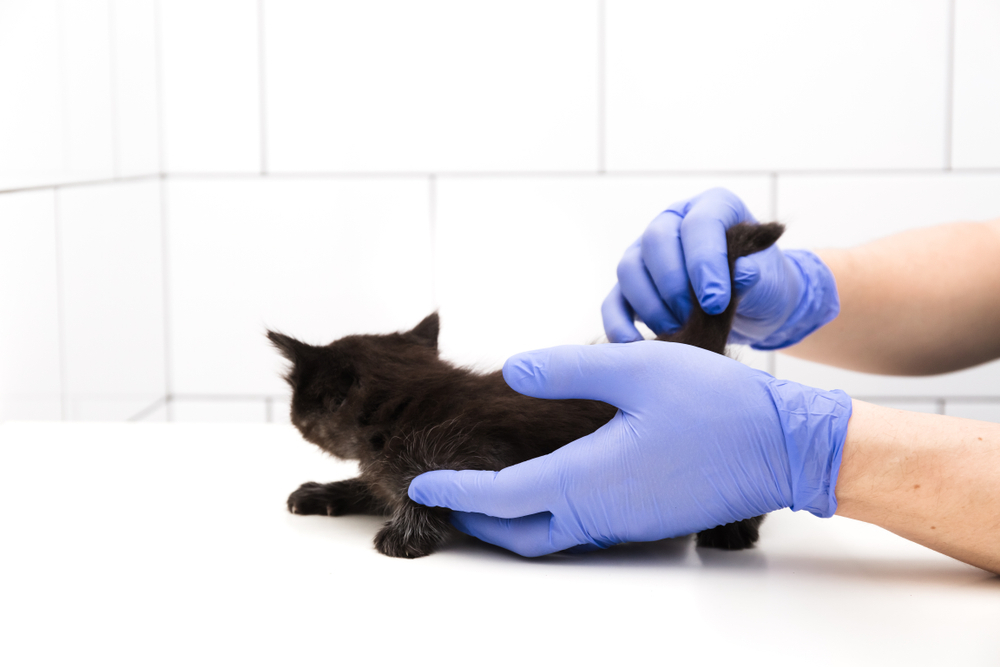
Your loveable feline friend was curled up on your pillow with you. They got up and left a surprise: blood-tinged fluid on the pillowcase. You know your cat is fixed, so that’s not it. Why is your cat’s butt bleeding?
Let’s take a look at some of the reasons and treatment options.
If your cat’s rectal area is bleeding, it’s essential to have your kitty evaluated by a veterinarian as soon as possible. Your vet will need to determine if the bleeding is coming from the skin around the rectum, rectal tissue, the anal sacs, or something internal.
The 5 Possible Causes for a Cat’s Butt to Bleed
1. Anal Sac Disease
Your cat has scent glands located in the rectum called the anal glands or anal sacs. These glands fill up with pungent material that cats usually express as they defecate. For different reasons, the anal sacs can fill up and become inflamed or infected.
Sometimes, the anal sacs will rupture, leading to a bloody discharge. You might see a visible hole when you lift up your cat’s tail on one of the sides of the rectum.
You are free to use this image but we do require you to link back to Catster.com for credit
Treatment
If your vet determines your cat has an anal gland abscess or anal sacculitis, the vet will likely put your cat on antibiotics and an anti-inflammatory pain reliever.
Commonly used antibiotics include:
Injectable Convenia
Oral Clavamox
Oral clindamycin
In severe cases, cats need their anal sacs flushed and infused with medication. Your cat could also need surgery to remove the affected anal sacs.
2. Trauma
Traumatic injuries to the rectal tissue can contribute to blood around the rectum. Cats can get scratches or bite wounds around the rectum. Foreign body injuries, such as punctured intestines or trauma to the colon, can occur secondary to eating bones and other materials.
An injury from being hit by a car can also cause rectal bleeding in your cat. If you suspect an injury, call the veterinarian immediately.
Image Credit: 4 PM production, Shutterstock
Treatment
Treatment for rectal trauma will depend on what happened and where. Depending on the injury, some cats will need surgery, and others will require antibiotics and pain medication. Your cat may also need to be on stool softeners to help them defecate without putting much pressure on the tear site.
3. Rectal Prolapse
Some cats experience a rectal prolapse when a portion of the rectal tissue comes out of the anus. It is most common in younger cats with severe diarrhea, such as kittens with intestinal parasites.
Treatment
Rectal prolapses should be treated immediately as the external tissue can dry out, lose its blood supply, and become necrotic. Your veterinarian will need to anesthetize your cat and replace the tissue.
They’ll then use a purse-string suture pattern to partially close the anal opening and help minimize the chances of a subsequent prolapse. If your cat has necrotic, unviable tissue, it must be surgically removed.
4. Tumors or Polyps
According to the Merck Veterinary Manual, rectal polyps are uncommon in cats. If they occur, they’re usually benign. Tumors or widespread cancer can occur within the anal tissues. Some cats develop anal gland tumors that can become large and block their anal opening.
Lymphosarcoma is typically a metastatic cancer that can spread mainly through the lymphatic tissue found throughout the body, including the intestines.
Treatment
Surgical removal is the best treatment for localized polyps so that they can be submitted for histopathology and analyzed to ensure they’re benign. Some other tumors in your cat’s rectum can be surgically removed. A biopsy might be necessary to characterize a tumor and help predict its behavior and best course of treatment.
Chemotherapy is useful for some cancers, such as lymphosarcoma or lymphoma. Your veterinarian might refer you to an oncologist for further treatment.
Image Credit: 135pixels, Shutterstock
5. Parasites
Parasites can also cause bleeding around your cat’s rear end. First and foremost, fleas can make cats so itchy that they scratch until they bleed, often around the tail. Intestinal parasites, such as hookworms, tapeworms, and roundworms, can cause intestinal upset and diarrhea.
Combined with that, or even with just the parasites, your cat may have blood in their stool called hematochezia.
Treatment
Treatment for parasites involves determining the type of parasites. Fleas are treated with flea prevention products like Revolution. Intestinal parasites can be treated with pyrantel, praziquantel, or other medications, depending on the parasites noted in history or fecal floatation.
Frequently Asked Questions
How Do You Tell if a Cat Has Worms?
You might see intestinal parasites in your cat’s stool. Roundworms typically resemble spaghetti noodles, while tapeworm segments resemble grains of rice. Cats with parasites often have diarrhea, and some kitties will also vomit.
They sometimes even vomit up worms. Some affected cats will also lose weight and might have dull coats.
Image Credit: Zhuravlev Andrey, Shutterstock
Can Cats Bleed From Straining to Defecate?
If your cat is constipated and straining very hard to defecate, they could start to pass a little blood. Your veterinarian will likely want radiographs (X-rays) to confirm this. They might give your cat an enema and place them on a stool softener. Some foods, such as a fiber-response diet, may also help.
Conclusion
If your cat starts to have blood around their rectal area, contact your veterinarian. If your cat is actively bleeding, it is a medical emergency. Your veterinarian will perform an exam to try and narrow down the possible causes and develop a treatment plan to help your cat and alleviate your worry.
Featured Image Credit: Hanna Taniukevich, Shutterstock






